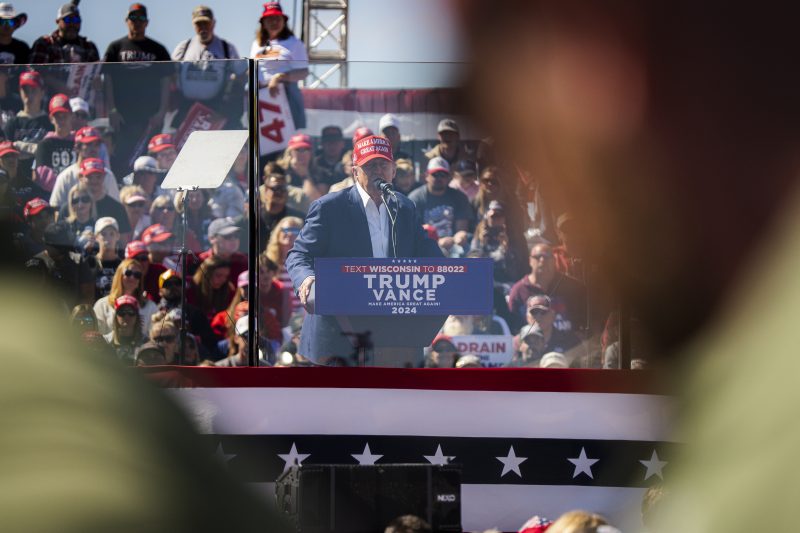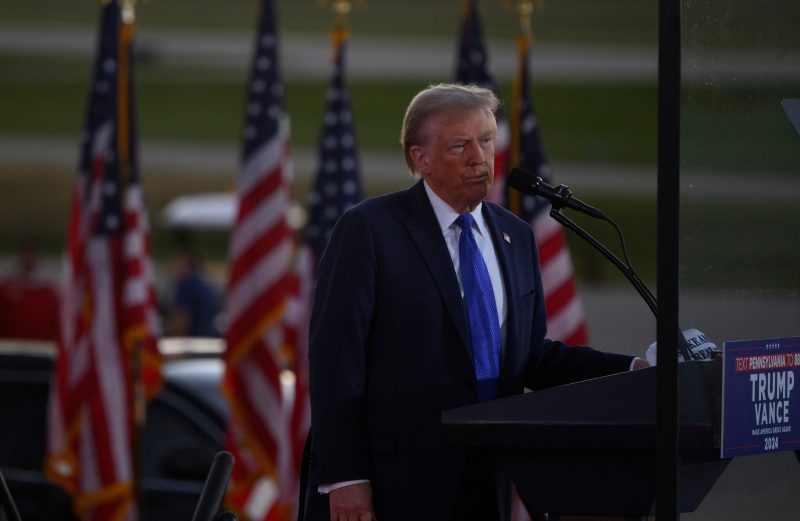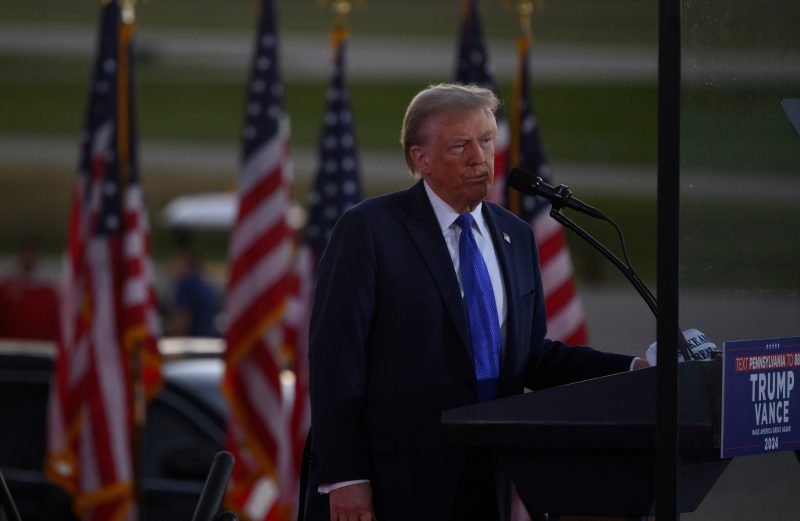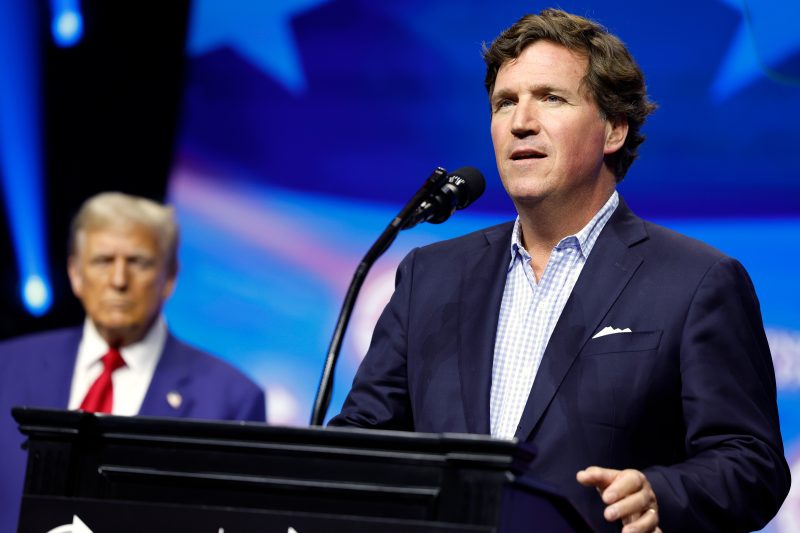
Assassination attempts, threats increase burdens on Trump campaign
Less than two weeks after an assassin’s bullet hit Donald Trump in the ear this summer, he was held backstage at a Nashville event for more than an hour because of a potential security threat.
A man had evaded security and disappeared into the crowd without being checked. There was a lengthy Secret Service search to review video, interview those he was seen with and learn why he had broken procedures. Advisers discussed whether Trump should go onstage, as a crowd of 20,000 people waited in the large auditorium. Should they cancel the event? But if they canceled the first large event after the shooting, what signal would that send?
Eventually the all-clear was given, and the event went off without a hitch.
“Former President Trump’s remarks were delayed at the 2024 Bitcoin conference in Nashville Tennessee while two credentialed and screened individuals were removed from the premises for not following proper entry protocols,” Secret Service spokeswoman Melissa McKenzie said in a statement Tuesday about the incident, which has not previously been reported. “It was determined that there was no protective interest with these individuals and there was never a threat to the former president.”
But the delay was emblematic of a growing burden that the alarming threats to Trump’s life have become for him and his campaign — a burden that has caused a grim mood on the campaign, especially after a second assassination attempt Sunday at his West Palm Beach, Fla., golf course.
Once a freewheeling former president who largely moved as he pleased, Trump has over the course of this year been increasingly constrained by the growing security precautions that surround him. He has survived what law enforcement has described as two assassination attempts, had his campaign emails hacked by alleged agents of the Iranian government and been the subject of a stream of threats from Iranian officials who are seeking revenge for his decision to kill Iranian general Qasem Soleimani in 2020.
As a result, almost every aspect of his campaign has faced new restrictions — and drastically more security. Events have taken far longer to plan because of limited resources. Bulletproof glass now boxes him in at outdoor events. Campaign officials have been warned by the government about the possibility of poisoning threats that could target the former president. His team has gotten nervous about drones targeting him at golf courses and at outdoor venues after hearing briefings from the Secret Service. He has been warned of the perils of playing golf, with some of his courses now off limits.
New screening sites have taken over a parking lot near Mar-a-Lago, his Florida social club, as the nearby roads have been repeatedly closed to through traffic, causing concern among local officials about gridlock, emergency response times and potentially restricting the ability of members to make use of his club.
Additional sharpshooters at his Bedminster Club in New Jersey have also frustrated Trump, because he fears their presence will scare off paying members.
“It has interfered with the way we’d like to campaign but it hasn’t caused us not to campaign,” one top adviser said.
This account of the expanding security network surrounding Trump is based on interviews with aides, advisers, law enforcement officials and others familiar with the matter, many of whom spoke on the condition of anonymity to disclose internal details.
Multiple campaign staffers have been told in recent weeks they have been a target of hackers. Staffers now use email sparingly, two advisers said. The campaign has provided mental health services since the Butler, Pa., shooting that wounded Trump in July, campaign advisers said.
Other top advisers to Trump have received death threats themselves, according to people familiar with the matter. Briefings by the FBI and Secret Service have become more frequent, they say, and campaign staff have been juggling their workload with requests for interviews from the multiple federal investigations of the Secret Service’s performance in Butler.
“We live in a military combat zone,” one Trump adviser said, describing the security apparatus now around Trump.
“There is constant chatter about Iran,” another campaign official said.
A spokeswoman for the campaign declined to comment and pointed to a post by Trump on his Truth Social website decrying Democrats for their rhetoric against him.
“Following the events of July 13 and at the direction of President Biden, the U.S. Secret Service has elevated the protective posture for all our protectees and bolstered our protective details as appropriate in order to ensure the highest levels of safety and security for those we protect,” McKenzie said.
Earlier this year, after beeping noises were found in the office, staffers grew concerned and called 911. The building was evacuated, as they thought they might be listening devices. Instead, they were part of a prank — chirping devices bought on Amazon, according to the West Palm Beach Police Department. But they caused hours of alarm, showing how concerned people are.
Trump, who has lived with federal personal protection since 2015, has said he has been surprised by the peril he now faces.
“Look, being president’s a dangerous job. It’s much more dangerous than a racecar driver, than anything. It’s probably the most dangerous profession if you think about it. Just go up and down the list,” he said during an Aug. 27 podcast interview with Phil McGraw. “ … I never realized how dangerous.”
David Urban, a longtime informal adviser, said the tension is natural after two apparent assassination attempts — and is exacerbated with a politician like Trump.
“There is an innate tension between campaigning and being 100 percent secure. Secret Service wants to wrap him in bubble wrap and put him on the shelf,” Durban said. “That’s what they want to do, that is their job. Their job is to keep him safe. He loves people. People love him. He’s a gregarious guy and he likes being out amongst people. He likes pressing the flesh.”
Trump has sought to go forward with his schedule, but campaign officials say it has been more difficult to plan events because of security limitations since the shooting in July. “There are certain places we just don’t want to go yet,” one of those people said. Trump himself wants to return to Butler for a cinematic rally near the end of the election.
The latest alleged attempt on Trump’s life, while he golfed Sunday at one of his golf clubs in West Palm Beach, has led to additional restrictions, as Congress debates an emergency funding request to provide additional federal protection for candidates through the November election.
Interim Secret Service Director Ron Rowe told Trump after the Sunday potential assassination that he should not play golf at some of his courses, which are not safe. Trump later joked with his team that he would take up bowling, according to people familiar with the situation.
Trump also asked for more resources and was told that he is already given a presidential-level detail, the people said. Trump argued that President Joe Biden faced less of a threat than he did, a person familiar with the conversation said.
A spokeswoman for the Secret Service declined to comment on the conversation.
After Secret Service agents found a man on Sunday in a tree line with a rifle, Trump was held for more than an hour because the agency needed to sweep his homes and make sure no one was there.
In late August, Trump cut short a news media interview because he had been warned by law enforcement against standing near the border outside his motorcade. Local authorities arrested a southern Arizona man that day on charges of making a death threat against Trump on social media.
“Can I tell you something? We’re in danger standing here talking, so let’s not talk any longer,” he told a reporter for News Nation after answering a couple of questions. “They don’t want me standing here. They don’t want you standing here.”
For much of the first three years after his presidency, Trump was seemingly less concerned about his safety, and security matters were handled largely in the background. He had built his political brand by entertaining massive crowds, appearing at outdoor rallies, UFC fights and college football games, often wading through throngs of adoring fans.
Bags and pockets were sometimes checked by security teams, and traffic passed without incident by Mar-a-Lago when he was there. In his off hours, he would mill about with guests, praising the shrimp and lobsters as he wandered the ballroom. The carefree attitude prompted one friend to encourage Trump to have Secret Service agents closer to his table, this person said, but Trump did not want that.
“I went to his club dozens of times and I was never wanded,” one person who knows Trump well said, referring to checks for weapons.
But those days are gone. The Town of Palm Beach now has a portion of its site dedicated to updating residents on road closures around Mar-a-Lago when Trump is in town. Residents and service providers are allowed to pass within the closure area with identification. The opening schedule for a nearby drawbridge is also adjusted depending on U.S. Coast Guard instructions. His clubs are now screening people.
“All procedures are continuously evaluated and changes may occur when necessary,” the town warns residents.
Trump has made macabre jokes about his new reality. He told a friend earlier this year that he would beat Biden, his opponent at the time, as long as he could stay alive.
Weeks after the Butler attack, at an August briefing for reporters in West Palm Beach, a campaign official reflected on the grim environment in response to a question about how Trump was handling the attack on his life.
“Truly a black swan election, a black swan election,” the official said. “My guess is we haven’t seen the end of it.”



